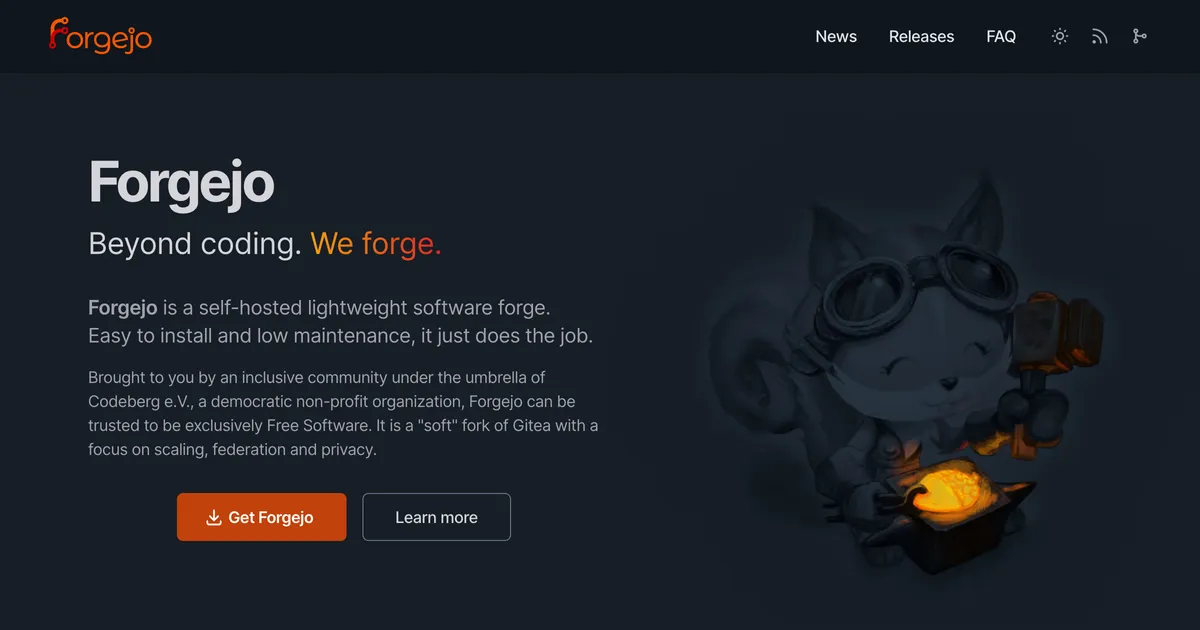- cross-posted to:
- selfhosting
- cross-posted to:
- selfhosting
Is this when they break drop-in compatibility with Gitea?
That would mean they would have to do actual development instead of just scraping off stickers, so I’m not holding my breath.
Is there some drama I’m not aware of here?
Forgejo is a reactionary fork of Gitea, started because the creator of Gitea founded a company to maintain it.
Secretly behind the backs of the official community council and not many months later started to turn Gitea into an open-core product.
And they also demand a CLA from contributors now, which is directly against the idea of FOSS.
I was a bit sceptical about the justification of this fork in the beginning as well, but time has proven the Forgejo team to be sadly completely right.
I’m not addressing anything Gitea has specifically done here (I’m not informed enough on the topic to have an educated opinion yet), but just this specific part of your comment:
And they also demand a CLA from contributors now, which is directly against the idea of FOSS.
Proprietary software is antithetical to FOSS, but CLAs themselves are not, and were endorsed by RMS as far back as 2002:
In contrast, I think it is acceptable to … release under the GPL, but sell alternative licenses permitting proprietary extensions to their code. My understanding is that all the code they release is available as free software, which means they do not develop any proprietary softwre; that’s why their practice is acceptable. The FSF will never do that–we believe our terms should be the same for everyone, and we want to use the GPL to give others an incentive to develop additional free software. But what they do is much better than developing proprietary software.
If contributors allow an entity to relicense their contributions, that enables the entity to write proprietary software that includes those contributions. One way to ensure they have that freedom is to require contributors to sign a CLA that allows relicensing, so clearly CLAs can enable behavior antithetical to FOSS… but they can also enable FOSS development by generating another revenue stream. And many CLAs don’t allow relicensing (e.g., Apache’s).
Many FOSS companies require contributors to sign CLAs. For example, the FSF has required them since 2005 at least, and its CLA allows relicensing. They explain why, but that explanation doesn’t touch on why license reassignment is necessary.
Even if a repo requires contributors sign a CLA, nobody’s four freedoms are violated, and nobody who modifies such software is forced to sign a CLA when they share their changes with the community - they can share their changes on their own repo, or submit them to a fork that doesn’t require a CLA, or only share the code with users who purchase the software from them. All they have to do is adhere to the license that the project was under.
The big issue with CLAs is that they’re asymmetrical (as opposed to DCOs, which serve a similar purpose). That’s understandably controversial, but it’s not inherently a FOSS issue.
Some of the same arguments against the SSPL (which is not considered FOSS because it is so copyleft that it’s impractical) being considered FOSS could be similarly made in favor of CLAs. Not in favor of signing them as a developer, mind you, but in favor of considering projects that use them to be aligned FOSS principles.
Well, I don’t disagree with your specific points, but you are missing that the founding idea of FOSS was a copyright hack to ensure that software remains modifyable/fixable by its users. A mandatory CLA that allows relicensing partially circumvents that not only for the users but even the contributors.
Sure you can argue that technically the already released code can not be relisensed, but that’s really missing the point that FOSS software intends to be open now and in the future.
Anyways, a good related read is: https://opensource.net/why-single-vendor-is-the-new-proprietary/
Am I out of touch?
No, it’s the Free Software Foundation that is wrong about Free software licensing practices!
CLAs can be abusive, but not necessarily. Apache Foundation contributors need to sign CLAs, which essentially codify in contract form the terms of the Apache 2.0 license. It’s a precaution, in case some jurisdiction doesn’t uphold the passive licensing scheme used otherwise. There’s also a relicensing clause, but that’s restricted to keeping in spirit, they can’t close the source.
And they started sending advertisement emails to people who registered on gitea.com.
Thanks for the info!
a decision was made in early 2024 to become a hard fork
They can decide and announce all they want. In the end they have to become a more compelling product than gitea on the merits, not just because of nebulous anti-commercial ideology.
Is there a time line for full Federation?
Best I can do is half Federation… 2/3 if you pay in cash.
What is this?
Self hosted GitHub, if i say in layman terms
deleted by creator
“Long term support” is 15 months?
Is this a fucking joke?
Codeberg is run off of donations, they have no service contract revenue. Nobody, much less a volunteer, wants to commit to a 5 or 10 year service plan like that, it’s not sustainable for a small project from a non profit.
I am sure Gitea will be happy to provide you longer support if you pay them for it /s
It’s about 5 times longer than previous releases were maintained for, and is an experiment. If there’s a need for a longer term support branch, there will be one. It’s pointless to start maintaining an 5+ year branch with 0 users and a handful of volunteers, none of whom are paid for doing the maintenance.
So yes, in that context, 15 months is long.
I’m working with an OS with a 26-year support window.
LTS is 10 years. Support the one that RH/Rocky toss into the next release. Anything less than 8 years requires air-quotes around the ‘L’.
MFW I get downvotes for repeating what used to be considered Enterprise support before the dotcom bust. Sorry to be the voice of the past.
“Software Forge” doesn’t readily describe its purpose to me.
It says on their main page… it’s basically self hosted GitHub.
The community has been taken over by a bunch of weirdos that refuse to click things and read
I’ll admit I didn’t click or read. But am I incorrect to expect some information on what I will assume is the landing page in the image?
Horses for courses. I find links to releases far more useful than a link to a front-page. They’re especially helpful when trying to find information/discussion on older releases.
softwares
That noun never gets an s at the end. It’s like ‘mail’ and ‘traffic’.











